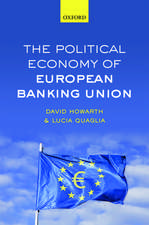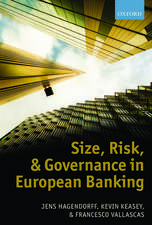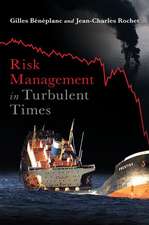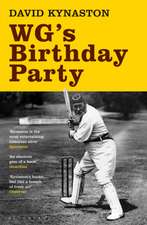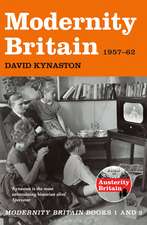The Bank of England: Money, Power, and Influence 1694-1994
Editat de Richard Roberts, David Kynastonen Limba Engleză Hardback – 18 mai 1995
Preț: 615.58 lei
Preț vechi: 929.60 lei
-34% Nou
Puncte Express: 923
Preț estimativ în valută:
117.83€ • 128.03$ • 99.04£
117.83€ • 128.03$ • 99.04£
Carte tipărită la comandă
Livrare economică 10-16 aprilie
Preluare comenzi: 021 569.72.76
Specificații
ISBN-13: 9780198289524
ISBN-10: 0198289529
Pagini: 328
Ilustrații: line figures
Dimensiuni: 162 x 241 x 24 mm
Greutate: 0.66 kg
Ediția:New.
Editura: OUP OXFORD
Colecția OUP Oxford
Locul publicării:Oxford, United Kingdom
ISBN-10: 0198289529
Pagini: 328
Ilustrații: line figures
Dimensiuni: 162 x 241 x 24 mm
Greutate: 0.66 kg
Ediția:New.
Editura: OUP OXFORD
Colecția OUP Oxford
Locul publicării:Oxford, United Kingdom
Recenzii
`Includes a fascinating table depicting the rise of the state machine this century.'The Guardian
The book is generated by a backwrd-looking event, a conference to mark last year's celebration of the bank's 300th anniversary. But the essays tingle with forward-looking speculation- will the Old Lady of Threadneedle Street finally break free from the bad company of politicians? It is rare for a collection of essays to offer such a rich diet, a tribute to the editors' skill.
The preface and introduction to this collection of essays...which includes several interesting, well-written and worthwhile contributions.
Accessible survey of three centuries of the Bank's history.
Provides an excellent historical summary.
A distinguished group of historians and economists provide an authoritative assessment of the major themes in the bank's history.
This wide-ranging institutional survey will be useful to readers interested in British economic history or banking.
The authors have ... provided a refreshing variety of retrospectives on different sub-periods of the Bank's 300 years and on different aspects of its evolution as a central bank.
The book is beautifully produced ... in one good-sized volume there is here an excellent coverage of the origins, growth, and development of the Bank which draws on archives not previously exploited. It is a fitting commemorative volume for the Bank's 300th anniversary.
The very praiseworthy ambition of the editors and organisers seems to have been to provide as much coverage as possible of the Bank's history in both its domestic and international setting from its founding to the present day - and to do this thematically ... The book is beautifully produced ... in one good-sized volume there is here an excellent coverage of the origins, growth, and development of the Bank which draws on archives not previously exploited. It is a fitting commemorative volume for the Bank's 300th anniversary.
It is to the credit of the editors and the contributors that it represents both a celebration and a serious scholarly analysis of the Bank over the past three centuries ... This book makes two important contributions to understanding this debate. On the one hand, it provides an extremely valuable perspective on how the Bank of England has come to occupy such a critical and influential position in the British economy over the whole of its history. On the other, it underlines how much the Bank's role has altered since Norman became Governor.
this is a serious and scholarly book aimed at the specialist and not the general reader ... There is no shortage of good histories of the Bank of England, but no scholarly ones roam over long periods and analyse long-term developments in the context of specific influences exerted upon the Bank by external forces. This is the task of this book and it is achieved with distinction within 200 pages which is no mean feat; the contributors know their stuff ... a remarkably good, useful and ambitious book. The publishers have also done a good job for the relatively modest cover price.
All of the chapters can be read for substantial intellectual profit and it would be invidious to highlight individual contributions ... the editors are to be congratulated for assembling an excellent team of authors who, collectively, have produced an indispensable work of scholarship on a critically important national institution.
It succeeds in demystifying many of the Bank's more arcane activities and, in taking the long view, it does offer a different perspective on the Bank's evolution than was available before ... a considerable addition to our understanding of the financial history of modern Britain.
The book is generated by a backwrd-looking event, a conference to mark last year's celebration of the bank's 300th anniversary. But the essays tingle with forward-looking speculation- will the Old Lady of Threadneedle Street finally break free from the bad company of politicians? It is rare for a collection of essays to offer such a rich diet, a tribute to the editors' skill.
The preface and introduction to this collection of essays...which includes several interesting, well-written and worthwhile contributions.
Accessible survey of three centuries of the Bank's history.
Provides an excellent historical summary.
A distinguished group of historians and economists provide an authoritative assessment of the major themes in the bank's history.
This wide-ranging institutional survey will be useful to readers interested in British economic history or banking.
The authors have ... provided a refreshing variety of retrospectives on different sub-periods of the Bank's 300 years and on different aspects of its evolution as a central bank.
The book is beautifully produced ... in one good-sized volume there is here an excellent coverage of the origins, growth, and development of the Bank which draws on archives not previously exploited. It is a fitting commemorative volume for the Bank's 300th anniversary.
The very praiseworthy ambition of the editors and organisers seems to have been to provide as much coverage as possible of the Bank's history in both its domestic and international setting from its founding to the present day - and to do this thematically ... The book is beautifully produced ... in one good-sized volume there is here an excellent coverage of the origins, growth, and development of the Bank which draws on archives not previously exploited. It is a fitting commemorative volume for the Bank's 300th anniversary.
It is to the credit of the editors and the contributors that it represents both a celebration and a serious scholarly analysis of the Bank over the past three centuries ... This book makes two important contributions to understanding this debate. On the one hand, it provides an extremely valuable perspective on how the Bank of England has come to occupy such a critical and influential position in the British economy over the whole of its history. On the other, it underlines how much the Bank's role has altered since Norman became Governor.
this is a serious and scholarly book aimed at the specialist and not the general reader ... There is no shortage of good histories of the Bank of England, but no scholarly ones roam over long periods and analyse long-term developments in the context of specific influences exerted upon the Bank by external forces. This is the task of this book and it is achieved with distinction within 200 pages which is no mean feat; the contributors know their stuff ... a remarkably good, useful and ambitious book. The publishers have also done a good job for the relatively modest cover price.
All of the chapters can be read for substantial intellectual profit and it would be invidious to highlight individual contributions ... the editors are to be congratulated for assembling an excellent team of authors who, collectively, have produced an indispensable work of scholarship on a critically important national institution.
It succeeds in demystifying many of the Bank's more arcane activities and, in taking the long view, it does offer a different perspective on the Bank's evolution than was available before ... a considerable addition to our understanding of the financial history of modern Britain.
Notă biografică
Richard Roberts is the author of the history of Schroders, and the editor of a series of studies of international financial centres. David Kynaston is the author of histories of the Financial Times, Cazenove, and the City of London.


